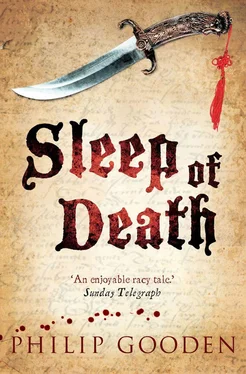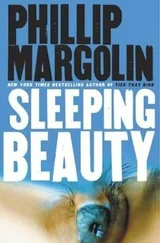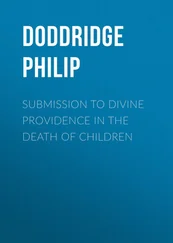Philip Gooden - Sleep of Death
Здесь есть возможность читать онлайн «Philip Gooden - Sleep of Death» весь текст электронной книги совершенно бесплатно (целиком полную версию без сокращений). В некоторых случаях можно слушать аудио, скачать через торрент в формате fb2 и присутствует краткое содержание. Год выпуска: 0101, ISBN: 0101, Издательство: Constable & Robinson, Жанр: Исторический детектив, на английском языке. Описание произведения, (предисловие) а так же отзывы посетителей доступны на портале библиотеки ЛибКат.
- Название:Sleep of Death
- Автор:
- Издательство:Constable & Robinson
- Жанр:
- Год:0101
- ISBN:9781472104311
- Рейтинг книги:5 / 5. Голосов: 1
-
Избранное:Добавить в избранное
- Отзывы:
-
Ваша оценка:
- 100
- 1
- 2
- 3
- 4
- 5
Sleep of Death: краткое содержание, описание и аннотация
Предлагаем к чтению аннотацию, описание, краткое содержание или предисловие (зависит от того, что написал сам автор книги «Sleep of Death»). Если вы не нашли необходимую информацию о книге — напишите в комментариях, мы постараемся отыскать её.
Sleep of Death — читать онлайн бесплатно полную книгу (весь текст) целиком
Ниже представлен текст книги, разбитый по страницам. Система сохранения места последней прочитанной страницы, позволяет с удобством читать онлайн бесплатно книгу «Sleep of Death», без необходимости каждый раз заново искать на чём Вы остановились. Поставьте закладку, и сможете в любой момент перейти на страницу, на которой закончили чтение.
Интервал:
Закладка:
‘Call me Will. Sack or sherry, Nell?’
‘Plain ale, sir — Will.’
My heart sank, not only at this display of familiarity but because my Nell could not drink without becoming light at the heels. She drank, not ladylike in little sips, but in great gulps. In that state she was liable to offer for nothing what she customarily exchanged for cash. I knew this because it had been how our acquaintanceship started. I poked her with my elbow but she ignored me. William called out to the potboy and gave his orders. Did he know what she was? Probably. Did he care? Probably not.
‘You are not from our city, are you, Nell? I can hear it in your voice.’
‘From our country, Will.’
‘Have you shut up shop for the day? Are your customers all gone?’ I said, in a none-too-subtle effort to inform William that he was dealing with a common whore and in case he had not been alerted to this fact by her dress or manner.
‘You keep a shop, Nell?’
She was all eyes for him, and he for her, and I was away on the edge of their vision and out of their minds. She was throwing back the tankard of ale and, in between gulps, no doubt casting up her eyes at him from under their lids.
‘In a manner of speaking, Will.’
‘And what do you trade in?’
‘Dainties. . and sweetmeats. . and suchlike.’
‘I expect you are well patronised.’
‘I always have room for another customer.’
‘No, you are never full, are you Nell?’ I said. ‘No matter how many crowd your parlour.’
‘Even so, I dare say that your stock goes fast,’ said William, ignoring my interjection.
‘So fast that it must soon be exhausted,’ I tried again.
‘It is always fresh, every day it is fresh,’ said Nell, also ignoring me and draining her pot to the last drop.
‘Another?’ said William Eliot. ‘And Nick, you as well?’
‘Thank you, I have not finished,’ I said, with what I hope was a bad grace. It seemed my fate to be accompanied by quick drinkers. I remembered the other evening in the Ram with Master Robert Mink and his love-lorn lyrics.
‘And whereabouts is your shop situated, mistress Nell? Where does a country girl set out her stall? I ask in case I should wish to inspect your wares.’
‘You should ask directions at the place which was my Lord Hunsdon’s mansion.’ (This was, by the by, a piece of coy indirection on the part of Nell, for the house she referred to was the place now known as Holland’s Leaguer.) ‘They will be able to tell you where I am to be found.’
‘I thought so,’ said William. ‘I have seen other vendors in that street, but none, I think, that may match you.’
‘Thank you, sir.’
By this time, Nell had almost finished her second pot, and I felt myself growing sick at heart.
‘Excuse me,’ said William. He went out into the yard, no doubt for a piss.
Nell turned to me. I was staring into the bottom of my tankard to avoid meeting her gaze.
‘Come, come, Nick,’ she said softly, laying her hand upon my knee. ‘It is all business.’
‘No pleasure, all trade,’ I said angrily.
‘Which would you prefer it to be? My trade is their pleasure. But it is my business, as yours is to tread the boards. We are all beholden to men from over the river.’
‘My trade is rather more respectable than yours, I think.’
‘You have not said so before.’
‘I have often thought it,’
‘I shall make it up to you,’ she said. ‘I shall restore you to good humour. Who can restore you as I can?’ she said softly but urgently, with ale-freighted breath, as she saw William Eliot returning.
I said nothing, but was a little mollified at her whispered words. It was true, who could restore me as she could? And considering all this afterwards, I had to concede that my Nell had some right on her side and that I had little excuse to interfere in her business. It was more that I did not care for it to be conducted under my nose. Nor could I be angry with William. He was only acting as I would have acted. There is also, I have observed, a little core of sweetness at the heart of jealousy. For, I think too, that I was for the first time fearful of losing her, I who had always taken the girl’s heart for granted whatever she might do with her body.
William joined us again but did not resume his position on the bench. He announced his intention to cross the river to return to his mother’s house and suggested that we share a ferry. I was relieved, for it meant that he did not intend a rendezvous with Nell at that moment, even were she willing. It meant too that, had I chosen, I could have returned with her to the place that she had described as Lord Hunsdon’s mansion. There she could make it up to me. By her little movements against my flank, that was what she seemed to have in mind. Meantime, William stood somewhat impatiently over us waiting for my answer.
‘Thank you, William,’ I said. ‘I am tired after a day’s play and I have parts to scan. I will go with you.’
I could sense my Nell’s disappointment, and was glad, and then wondered if I shouldn’t after all have accompanied her so that she might do her worst with me.
I have just now talked with the doorkeeper of the Eliot house, and I must this instant write down what he said. It is the only way to order my mind and to set things in their proper sequence. This fellow’s name is Tom Bullock and he fits it, being thick across the forehead, the shoulders, the chest, etc. Unlike in my interview with the unfortunate Francis I do not have to straighten out and tidy up his words. What Bullock had to say he said, and no more besides. And, when I had heard him, I almost wished the questions had remained unasked. I was seeking to discover whether anybody unknown or unexpected had visited the house on the afternoon of Sir William’s death. The doorkeeper has a small cubby-hole by the main entrance and anybody wishing to enter the house — or leave it, for that matter — must pass him. Perhaps Bullock sees himself as a man of a somewhat philosophical turn of mind and thinks that the greatest wisdom shows itself best in the fewest words.
Nick Revill: You remember the day of Sir William’s death?
Tom Bullock: Of course.
NR: You were on duty here?
TB: Where else would I be?
NR: When were you aware that something had happened?
TB: Something?
NR: I will be more precise. When did you first become aware that the master of the house was dead?
TB: Let me ask you a question, Master Revill.
NR: I am at your service, Master Bullock.
TB: Why are you asking me these questions?
NR: You have probably heard that I am a player.
TB: I have heard.
NR: From your tone I can see you have no very high opinion of our profession.
TB: Everyone must have a living.
NR: I am with the Lord Chamberlain’s Company. We play at the Globe on the other side of the river. Indeed, I was privileged to meet the master and mistress of this house at one of our performances.
TB: It was there also that you met Adrian the steward, I am told.
NR: Yes.
TB: And discovered him for a thief.
NR [ thinking that I had glimpsed the reason for the doorkeeper’s hostility ]: It is true that I had a hand in that business. I did not dismiss him, that was your master. I merely helped to expose him.
TB: I am no friend to Adrian. He got what he deserved. He is a dishonest and high-handed man.
NR: Well, we are in agreement.
TB: If you think so. But you have left my question by the wayside.
NR: Your question?
TB: Why do you wish to know about the old master’s death?
NR [ forced to pluck some explanation out of the air ]: I have it in mind to compose a tragedy, a deep respectful tragedy of the domestic sort, like. . like Arden of Faversham.
Читать дальшеИнтервал:
Закладка:
Похожие книги на «Sleep of Death»
Представляем Вашему вниманию похожие книги на «Sleep of Death» списком для выбора. Мы отобрали схожую по названию и смыслу литературу в надежде предоставить читателям больше вариантов отыскать новые, интересные, ещё непрочитанные произведения.
Обсуждение, отзывы о книге «Sleep of Death» и просто собственные мнения читателей. Оставьте ваши комментарии, напишите, что Вы думаете о произведении, его смысле или главных героях. Укажите что конкретно понравилось, а что нет, и почему Вы так считаете.












